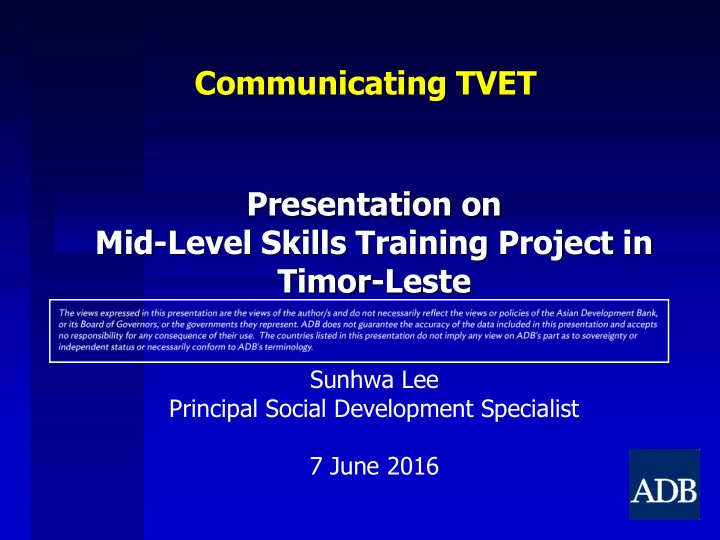

Communicating TVET Presentation on Mid-Level Skills Training Project in Timor-Leste Sunhwa Lee Principal Social Development Specialist 7 June 2016
Overview on Timor-Leste Independence formalized in May 2002 • Population: 1.1 million (2014) • GDP per capita at $1,214 mainly due to its petroleum • wealth, but still with poor human development indicators Population below poverty: 39% (2013) • Total fertility rate: 5.7 per woman • A large youth population: • - population under age 20: 52% Youth unemployment (age 15-29) • - total 19%; urban 27% - underemployment also prevalent
Project Outcome Enhanced TVET system with mid-level skills training that is • relevant and responsive to labor market needs - Focused on construction and automotive trades: accredited training for certificate levels 2-4 - Support for the country’s large infrastructure investments • Project cost: $12 million (plus $1 million gov’t) • Implementation: 2012 – 2016 (extend to June 2017) • EA/IA: Secretariat of the State for Professional Training & Employment Policy (SEPFOPE) ** post-secondary TVET **
Project Outputs Mid-Level Skills Training provision 1. - support for training facilities & equipment in all accredited training centers (5), including dormitory; development of competency-based standards; training delivery - As of March 2016, 1,500+ trained; - 700+ in levels 2-3 (21% females) Technical teacher training 2. - all teachers qualifications upgraded (e.g., diploma 2) 3. Enhancing labor market linkages of TVET - TVET promotion & career guidance - Workplace training - Improved LMIS (ILO) Strengthening TVET financing & support 4. - financing plans for training providers - expanding access to TVET (e.g., scholarships)
Development of TVET Communication Strategies Hiring of a Social Marketing & Communication Specialist • Development of a 2015 TVET Communication Plan • (SEPFOPE initiatives) A Youth Training & Employment Perception Study in 2014 • - 600+ survey respondents (youth, parents, others) - 40+ interviews across 4 districts Key findings of the survey: • - unaware of “TVET” but heard of “training” (e.g., “ Formasaun Profisional ”) - poor perception of “training”: “only for those who don’t go to a university” - barriers to training: distance & costs - unaware of TVET certificates leading to employment
TVET Communication Strategies Key objectives of communication strategies: • - inform target groups about training & employment (e.g., youth, employers, decision-makers, TVET centers/students) - change public opinions about TVET (e.g., better message) - educate employers and other stakeholders - motivate youth to adopt new attitudes & career planning TVET promotion strategies: • - short films (3), TV advertisements, radio spots, comic strips - facebook group, accredited signage for training centers - workshops for graduating senior high school students (especially for females) - skills competition (2014, 2015) Total costs: $250,000+ for activities • Consultant: $170,000 (for 2+ years) •
Focus and Evaluation of Communication Strategies “ Formasaun Profesional : Train People in order to Work” • by using the same brand, messages, and role models - information about “training” and “accreditation” - campaign about employment and career guidance (e.g., matching skills and interests, seeking job opportunities) Exposure to TVET campaigns: evaluating costs vs. effectiveness • - Overall exposure to the campaign: 93% - short films: 75% (through TV) - radio ads: 61% - comic strips: 70% (28% from newspapers; 36% from training center) - Facebook: 27% - accreditation posters: 77% All positive views “informative” “helpful” “relevant to me”
Mid-Level Skills Training Project
Key Lessons • Essential to be led by government and training providers (e.g., skills competition): “ownership” • Important to define specific target groups (e.g., community perception surveys) -- including employers as target audience • Important to understand the local context & local language to design promotion strategies • Creating consistent messages – “branding” • Important to have a good specialist versed in local languages and local youth culture • Educating key stakeholders – trainers & training providers about relevance to the job market
Recommend
More recommend